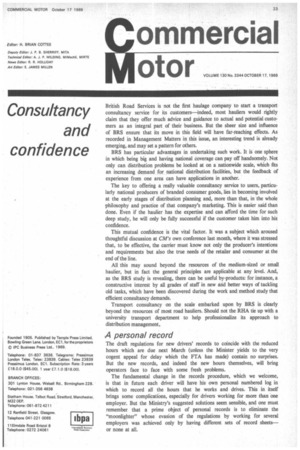Commercial Motor VOLUME 130 Na. 3344 OCTOBER 17, 1969 British
Page 25

If you've noticed an error in this article please click here to report it so we can fix it.
Road Services is not the first haulage company to start a transport consultancy service for its customers—indeed, most hauliers would rightly claim that they offer much advice and guidance to actual and potential customers as an integral part of their business. But the sheer size and influence of BRS ensure that its move in this field will have far-reaching effects. As recorded in Management Matters in this issue, an interesting trend is already emerging, and may set a pattern for others.
BRS has particular advantages in undertaking such work. It is one sphere in which being big and having national coverage can pay off handsomely. Not only can distribution problems be looked at on a nationwide scale, which fits an increasing demand for national distribution facilities, but the feedback of experience from one area can have applications in another.
The key to offering a really valuable consultancy service to users, particularly national producers of branded consumer goods, lies in becoming involved at the early stages of distribution planning and, more than that, in the whole -philosophy and practice of that company's marketing. This is easier said than done. Even if the haulier has the expertise and can afford the time for such deep study, he will only be fully successful if the customer takes him into his confidence.
This mutual confidence is the vital factor. It was a subject which aroused thoughtful discussion at CM's own conference last month, where it was stressed that, to be effective, the carrier must know not only the producer's intentions and requirements but also the true needs of the retailer and consumer at the end of the line.
All this may sound beyond the resources of the medium-sized or small haulier, but in fact the general principles are applicable at any level. And, as the BRS study is revealing, there can be useful by-products: for instance, a constructive interest by all grades of staff in new and better ways of tackling old tasks, which have been discovered during the work and method study that efficient consultancy demands.
Transport consultancy on the scale embarked upon by BRS is clearly beyond the resources of most road hauliers. Should not the RHA tie up with a university transport department to help professionalize its approach to distribution management,
A personal record
The draft regulations for new drivers' records to coincide with the reduced hours which are due next March (unless the Minister yields to the very cogent appeal for delay which the FTA has made) contain no surprises. But the new records, and indeed the new hours themselves, will bring operators face to face with some fresh problems.
The fundamental change in the records procedure, which we welcome, is that in future each driver will have his own personal numbered log in which to record all the hours that he works and drives. This in itself brings some complications, especially for drivers working for more than one employer. But the Ministry's suggested solutions seem sensible, and one must remember that a prime object of personal records is to eliminate the "moonlighter" whose evasion of the regulations by working for several employers was achieved only by having different sets of record sheets— or none at all.




























































































































